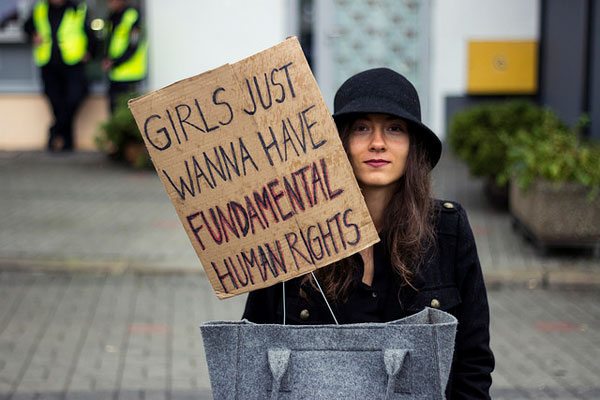
January 18, 2018; Al Jazeera
Women in Poland and the US have seen major attempts to curtail their abortion rights this week. Alarmingly, the response from civil society is not nearly as loud as it was the last time either country attempted similar restrictions.
In Poland, lawmakers struck down a bill that would liberalize abortion access, which is strictly limited by the conservative, Catholic government. Going one step further, they drafted a proposal to ban the abortion of “sick fetuses”—those with detectable maladies that range from cerebral palsy to Down’s syndrome to other forms of incomplete development that can be detected by testing of the umbilical fluid early on in a pregnancy.
Abortion is currently illegal in Poland except in cases of rape, when the pregnancy jeopardizes the mother’s life, or where there is irreparable damage to the fetus. Access is so difficult that Women on Waves actually airlifted abortifacient pills into the country in 2015. “We’re showing that we know that a complete abortion ban is on the table in Poland,” Marta Lempart of the Polish Women’s Strike told Al Jazeera. “After the rejection of the Save Women bill, we feel that we are on our own and we have to act.”
Last year, an even more draconian bill was proposed, in which women would face jail time for nearly any abortions, including in cases where the fetus was unviable, even if it were a medically necessary procedure that ended in miscarriage. Jaroslaw Kaczynski, the head of the ruling Law and Justice party, explained that this would allow for baptisms and burials, apparently discounting the trauma incurred by a woman carrying a dangerous or unviable fetus for 10 months. All over Poland and the rest of the world, tens of thousands of men and women took to the streets dressed in black in a demonstration that came to be known as Black Monday, and the bill did not pass. Lempart told Newsweek after last year’s protest, “After that, the next and every other government will know not to anger Polish women.” Apparently, they forgot.
Sign up for our free newsletters
Subscribe to NPQ's newsletters to have our top stories delivered directly to your inbox.
By signing up, you agree to our privacy policy and terms of use, and to receive messages from NPQ and our partners.
This year, according to Radio Poland, only 1,500 people turned out in Warsaw to march. Since Polish media is controlled by the state, that may be an underestimate, though no other English-language outlets are reporting numbers at this time. Radio Poland also claimed that protestors paint-bombed the ruling party’s headquarters with 11 balloons filled with pink paint. Suffice to say that no string of sister protests, as happened in the US, France, Sweden, India, and the UK in 2016, was reported as taking place this time. The Washington Post writes, “It wasn’t immediately clear how many took place in other cities. The turnout appeared far smaller than similar marches which mobilized huge crowds in 2016.”
According to Bloomberg, “Boosted by unprecedented social handouts, the ruling party’s public support stands at 43 percent of the electorate, six percentage points more than it won in the 2015 election.”
In the US, where the ruling party’s representatives in Congress are “sprinting for the exits,” according to CNN, less draconian but still concerning moves are taking place. The New York Times reported, “The Trump administration announced on Thursday that it was taking new steps to protect doctors, nurses, and other health workers who have religious or moral objections to performing abortions or sex-change operations, or providing other medical services.”
The fight over abortion access in the US is one place where the ability of the nonprofit sector to step in where the government has abdicated responsibility is absolutely crucial. If these “new steps” are enacted and stand up to court scrutiny (which is doubtful but not impossible), then thousands if not millions of women and transgender individuals will lose access to care, leaving a gap into which nonprofits must step.
This weekend, on the anniversary of the Women’s March, thousands of women will again take to the streets, protesting the eroding of women’s rights, the lack of justice for missing and murdered indigenous women, and more. The yearly proposal of measures to restrict women’s access to healthcare, the yo-yoing status of the global gag rule, and the ongoing efforts to defund organizations like Planned Parenthood demonstrate the continued need for advocacy, attention, and outreach from civil society. If Lempart and others intend to prevent the passage of these restrictive laws, they’re going to need some amplification.—Erin Rubin











